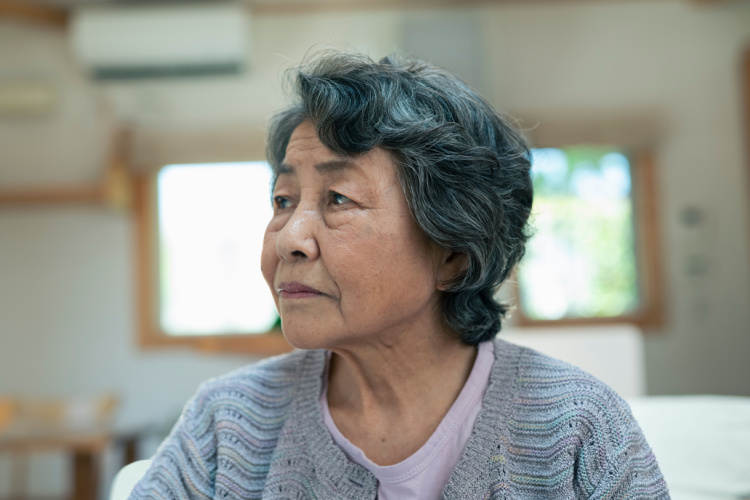
Depression is an often misunderstood and underestimated challenge that can affect individuals of all ages. But when it comes to older adults, it presents unique complexities that require a closer look. Contrary to popular belief, depression is not an inherent part of growing older; it is a genuine medical condition that demands our attention and care.
Table of Contents
- Understanding Depression in Older Adults
- Misconceptions About Depression in Older Adults
- Recognizing the Signs and Symptoms
- The Importance of Early Detection
- Common Triggers for Depression in Seniors
- Effective Strategies for Coping with Depression
- Seeking Professional Help at Blue Moon Senior Counseling
- Frequently Asked Questions (FAQs)
- Take the First Step to a Better Tomorrow With Blue Moon Senior Counseling
Understanding Depression in Older Adults
According to the CDC, Depression is not a normal part of aging, yet it affects a significant number of older adults. Approximately 6 million American adults who are 65 or older struggle with depression. This mental illness may hit them in their later years. However, only about 10 percent of this demographic gets treatment.
Depression in older adults is often characterized by a pervasive feeling of sadness and despair that lasts for an extended period. Unlike occasional sadness, depression is a medical condition that requires attention and care. Many factors can contribute to depression in seniors, including physical health issues, loss of loved ones, and social isolation. It’s important to note that these factors can interact and exacerbate depressive symptoms.
Understanding this complexity is vital for family members, caregivers, and healthcare professionals. By recognizing that depression is not merely a consequence of aging but a treatable condition, we can take appropriate steps to address it.
Physical Manifestations of Depression
Moreover, older adults may experience physical symptoms such as fatigue, unexplained aches and pains, and changes in appetite or weight. These physical manifestations can often be misattributed to the aging process itself, leading to underdiagnosis and undertreatment of depression. According to the National Heart, Lung, and Blood Institue, depression in the elderly is linked to an increased risk of heart problems
When considering the physical aspects of depression, it’s essential to acknowledge that mental and physical health are interconnected. Depression can manifest in various ways, and physical symptoms should not be dismissed without considering their potential link to emotional well-being.
Misconceptions About Depression in Older Adults
Misconception 1: Depression is a Normal Part of Aging
One of the most significant misconceptions is that depression is an expected part of growing older. This is not true. While older adults may face unique challenges, depression should never be dismissed as a natural consequence of aging.
Misconception 2: Older Adults Don’t Experience Emotions as Intensely
Another misconception is that older adults don’t experience emotions as intensely as younger individuals. Depression can affect people of all ages, and its impact on emotional well-being should not be underestimated.
Misconception 3: Seniors Should “Just Snap Out of It”
Telling a depressed senior to “snap out of it” or “think positively” is not only unhelpful but can also exacerbate their feelings of hopelessness. Depression is a complex medical condition that requires understanding and professional support.
Recognizing the Signs and Symptoms
Identifying depression in older adults can be challenging, primarily because it often presents differently than in younger individuals. To recognize it effectively, we must be vigilant about the following signs and symptoms:
Persistent Sadness:
One of the hallmark signs of depression in older adults is an enduring sense of sadness or hopelessness. This sadness is not fleeting but rather lingers for an extended period, affecting the individual’s overall quality of life.
Seniors may be hesitant to express their feelings, so family members and caregivers need to initiate open and empathetic conversations. A senior’s emotional well-being can greatly benefit from feeling heard and understood.
Loss of Interest in Activities:
Depression can lead to a diminished interest in activities that were once enjoyed. Seniors may withdraw from social engagements, hobbies, and other pursuits they used to find pleasurable.
Encouraging seniors to stay engaged in activities they love is essential. It not only provides enjoyment but also promotes social interaction, which can combat isolation and loneliness.
Changes in Appetite or Weight:
Depression can impact an older adult’s eating habits, leading to either significant weight loss or weight gain. These changes can contribute to overall health decline.
Monitoring a senior’s dietary habits and ensuring they have access to nutritious meals can play a crucial role in their recovery. If appetite changes persist, seeking medical advice is advisable.
Difficulty Sleeping:
Sleep disturbances, such as insomnia or oversleeping, are common in seniors with depression. Sleep problems can exacerbate feelings of fatigue and exacerbate the condition.
Establishing a regular sleep routine and creating a comfortable sleep environment can help seniors improve their sleep patterns. Addressing sleep issues is a vital component of managing depression.
Physical Symptoms:
As mentioned earlier, depression can manifest physically, with older adults experiencing unexplained aches, pains, and fatigue.
Encouraging seniors to communicate any physical discomfort they may be experiencing is important. Treating underlying physical symptoms can contribute to their overall mental well-being.
The Importance of Early Detection
Early detection of depression is critical for effective treatment and improved quality of life. Unfortunately, depression often goes undiagnosed in older adults due to stigma or the misconception that it’s a natural part of aging. This misconception can lead to a lack of attention and intervention when it’s needed most.
Family members, caregivers, and healthcare providers should prioritize routine mental health assessments for seniors. By identifying depression early, appropriate interventions can be implemented, preventing the condition from worsening.
Common Triggers for Depression in Seniors
Understanding the triggers of depression in older adults is essential for prevention and intervention. Several factors can contribute to the development of depression in seniors:
Major Life Changes:
Events such as retirement, the loss of a spouse or friends, and chronic illnesses can be significant triggers for depression. Adjusting to life changes can be challenging, and the emotional impact can be profound.
Family members and friends can provide emotional support during these transitions. Ensuring seniors have a strong support network can help them successfully navigate these changes.
Social Isolation:
Seniors who are socially isolated are at a higher risk of developing depression. Limited social interactions can lead to feelings of loneliness and despair. Studies show that loneliness and social isolation are associated with higher rates of depression.
Encouraging seniors to maintain social connections! If they can’t get around, using video calling on Messenger, Zoom, or Facetiming with loved ones, can alleviate feelings of isolation.
Financial Stress:
Financial difficulties can be a source of stress and worry, contributing to depression in older adults.
Financial anxiety is a prevalent issue among seniors, but it can be effectively managed with the proper support and resources. Blue Moon Senior Counseling offers specialized counseling services designed to address the unique financial concerns of older adults.
Effective Strategies for Coping with Depression
Coping with depression in older adults requires a multifaceted approach. Here are some strategies that can help mitigate depressive symptoms:
Physical Activity:
According to the National Institute of Aging, physical activity can improve mood and overall well-being. Exercise releases endorphins, which are natural mood lifters.
When introducing physical activity as a coping strategy, it’s crucial to tailor it to the individual’s capabilities. Gentle exercises like walking, water aerobics, or yoga can be excellent options for seniors.
Healthy Diet:
Maintaining a balanced and nutritious diet is essential for physical and mental health. Nutrient-rich foods can support brain function and mood regulation. A diet rich in omega-3 fatty acids, whole grains, fruits, and vegetables can positively impact mood and cognitive function.
The USDA features the MyPlate Kitchen, a resource that helps you find healthy recipes that fit your nutrition needs and create a shopping list. The MyPlate Plan tool will create a customized food plan for you based on your age, height, weight, and physical activity level.
Social Engagement:
Staying connected with friends and family becomes increasingly important for seniors, especially when physical travel may not be feasible. Fortunately, in today’s digital age, social media offers a plethora of tools to bridge the gap. Social networks such as Facebook and Instagram, offer invaluable means for seniors to maintain vital connections, engage in social activities, connect with friends and family, or join community groups.
Enjoyable Hobbies:
Engaging in hobbies and activities that bring joy can significantly improve mood. Whether it’s painting, gardening, playing music, or doing exercise such as yoga, it can be therapeutic.
Encourage seniors to explore new hobbies or revisit old interests. This can spark enthusiasm and add a sense of purpose to their lives.
Seeking Professional Help at Blue Moon Senior Counseling
When it comes to depression, seeking professional help is a critical step in the recovery process. At Blue Moon Senior Counseling, we are dedicated to providing the highest quality of care for our clients. We use specialized assessments such as the Geriatric Depression Scale (GDS) to evaluate the severity of depression in older adults accurately.
Additionally, our experienced therapists are well-versed in working with older adults and providing specialized telehealth services tailored to their unique needs. We understand the complexities of depression in older adults and offer compassionate and individualized treatment plans to help seniors regain their emotional well-being. We are committed to providing the support and guidance needed for a happier and healthier life.
Frequently Asked Questions (FAQs)
- Is depression common among older adults?
Depression can affect older adults, but it is not a normal part of aging. It’s essential to recognize the signs and seek help if needed.
- How can I help a loved one who may be suffering from depression?
Supportive conversations, encouraging activities, and assisting them in seeking professional help are essential steps in helping a loved one with depression.
- What are the treatment options for depression in older adults?
Treatment options may include therapy, medication, lifestyle changes, and support from loved ones. The most effective approach varies from person to person.
- Can depression in older adults be prevented?
While it may not always be preventable, recognizing risk factors and taking proactive steps can reduce the likelihood of depression in older adults.
- How can I access telehealth counseling services at Blue Moon Senior Counseling?
Contact us today to schedule a telehealth counseling session with one of our experienced therapists. We are here to support you or your loved one on the path to emotional well-being.
Take the First Step to a Better Tomorrow With Blue Moon Senior Counseling
Depression in older adults is a pressing issue that requires attention and understanding. By recognizing the signs, understanding the triggers, and seeking professional help when needed, we can make a significant difference in the lives of our senior population. At Blue Moon Senior Counseling, we are committed to providing specialized telehealth counseling services to promote mental well-being and enhance the quality of life for older adults. Together, we can ensure that depression in older adults is identified and addressed effectively, allowing them to enjoy their golden years to the fullest.
Our compassionate team is here to provide tailored counseling services to help you navigate the challenges of late-life depression. Don’t wait any longer—reach out to us and discover a better tomorrow.
Contact us today, or call us at 630-896-7160










